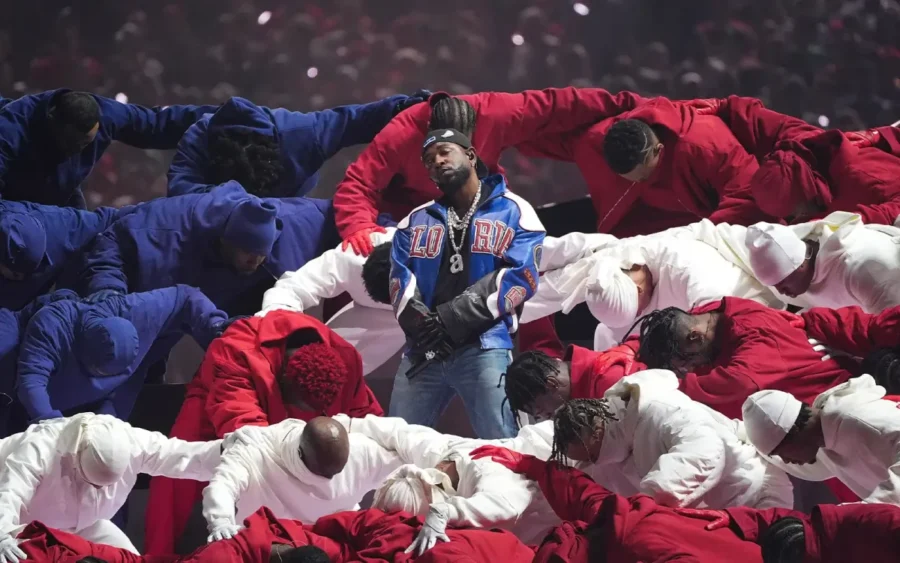Can We Bridge the Nation’s Wealth Gap?
At this year’s Super Bowl halftime show, Kendrick Lamar didn’t mince words.
In fact, he took it a step further, bringing out Uncle Sam (or rather, Samuel L. Jackson in a star-spangled top hat) to make sure the tone was set so explicitly that the American public had a chance of truly hearing him.
“Salutations,” Jackson called out, grinning as Lamar’s hit ‘Squabble Up’ teased the speakers. “This is the great American game.“
Lamar and his dancers moved seamlessly across the stage, which was fashioned to look like a video game controller with its Xs and Os. In solid red, white, or blue jumpsuits, the dancers were second in their patriotism only to Uncle Samuel L. Jackson, who stood watch over the performance.
“Forty acres and mule–this is bigger than the music,” Lamar called out before his notorious hit ‘Not Like Us’ started.
But wait—what was he talking about?
If we turned down the music slightly and turned back the time by centuries, we would be standing at the precipice of a post-slavery America. A moment in history, just after the Civil War, when General William T. Sherman had issued an order that would likely be labeled as DEI in today’s culture: Special Field Order 15, more commonly known as “forty acres and a mule.”
The order promised formerly enslaved Black families that they would receive 40 acres of land and a mule after the war so they could begin building wealth and work toward economic independence. However, President Andrew Johnson quickly revoked the promise, instead returning the land to former Confederate owners.
Thus, a foundational opportunity for Black wealth-building was deliberately denied. This opportunity loss was but the first of many inequitable policies in a new, post-slavery America that seemed bent upon the economic suppression of BIPOC Americans. (Policies like the Dawes Act, Federal Housing Administration, GI Bill, eminent domain, etc.).
And so, 160 years later, Kendrick Lamar stands upon America’s stage–the most viewed telecast in U.S. history–and reminds Americans what they’ve lost in this here “great American game.”
Lamar asks us to remember the centuries of opportunity stolen from generations of Americans and ask ourselves, ‘When do we change the game?’
Can we change course?
At United Way of King County, we’ve spent decades tackling urgent needs—ensuring families have food on the table, young people have a place to call home, and communities have a safety net when crisis hits. But we know the root causes of these struggles go deeper. It’s not just about what a family lacks today—it’s about what was denied to them yesterday, as Lamar called out, and what might never come tomorrow if we don’t change course.
King County is one of the wealthiest regions in the country; the average white family holds three times the wealth of the average Black family. This isn’t accidental—it’s the result of decades of discriminatory lending, redlining, land seizures, and exclusion from government programs like the GI Bill or Social Security. Even today, the impacts linger: credit barriers, capital gaps, and neighborhood disinvestment continue to shut families out.
As author Matthew Desmond reminds us, “Poverty is not just the condition of not having enough money—it’s the condition of not having enough choice and being taken advantage of because of it.”
At United Way of King County, we’re launching a bold new campaign called Bridging the Wealth Gap, an initiative to confront the wealth divide head-on. Over the next five years, we aim to raise $30 million to expand access to two of the most powerful drivers of generational wealth: homeownership and small business ownership. These are not luxuries—they’re lifelines. And for too long, communities of color have been locked out.
This campaign isn’t just about dollars raised—it’s about justice restored. It’s about rewriting the future by investing in the families and entrepreneurs who’ve been unjustly overlooked. When we support a first-time homebuyer with down payment assistance or fund a Black-owned startup ready to grow, we’re not offering charity; we’re offering a chance—the same chance other families have had for generations.
Can we bridge the nation’s wealth gap? We believe we can start here.
Learn more about our bold new campaign at our Bridging the Wealth Gap Campaign site.
Together, we can build a future that’s not defined by disparity, but by possibility.
“Not everything that is faced can be changed, but nothing can be changed until it is faced.”
— James Baldwin


Comments